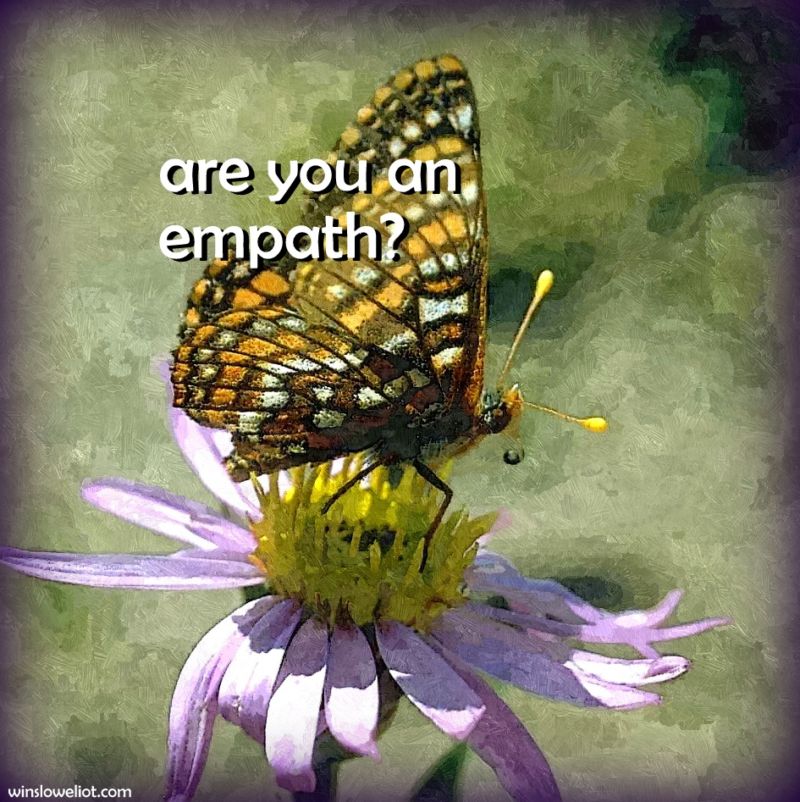
Stillness 9-11: The wordy “empathy” evolved from a German psychological term Einfühlung in the early 20th century. Literally, Einfühlung means “feeling-in,” and, since there wasn’t a comparable word in English, a couple of psychologists remembered their Greek lessons and replaced the Greek “em” for “in” and “pathos” for “feeling.” The word initially was the opposite of what it means now—it described what happens when we project our feelings onto an inanimate object and sort of bring it to life. It wasn’t till the 1980s that empaths, describing people with heightened compassion for and experience of other peoples’ feelings, came into our language.
Neurologists have determined that empaths have super-active mirror neurons that are extra-attuned to pick up emotional cues from other people. They are always discerning, parsing, and emotionally responding to what’s around them. For children, especially, this can be exhausting, which is why they need sleep so earnestly. Another trait is that they sometimes experience sudden, overwhelming emotions when they’re out and about in public. I’ll always remember being on the NYC subway with my two young children heading up to meet someone at a museum. As I set on a bench in the subway car, I felt an overwhelming grief that practically crushed me. The sensation was so real and so frightening I knew I wasn’t safe and had to get out of the subway as soon as I could.
I think most of us are empaths to some degree (unless we’re sociopaths or psychopaths). Most of us, for example, take on other peoples’ emotions as our own. For example, when someone describes an experience to us, it becomes ours—in some way or other.
Are you an empath? Here are some other traits: Your environment is important—you need peace and calm surrounding you, because then you take on those qualities inwardly. Outward chaotic jumbles and grim, depressing hallways and rooms (like many public school buildings) can be extraordinarily draining. Be sure to surround yourself with beauty, loveliness, harmony because that’s what you then absorb.
People seek you out for your insight because you’re calm, you listen patiently, and you respond from your heart. As healers, empaths intuit what someone else is feeling, without their having to express it. This is one reason I love tarot so much: it can express a feeling through archetype and symbol rather than through language. Tarot is wonderfully healing for empaths who long to connect with and relate to other people, but not to absorb their pain and suffering.
Here’s another trait of an empath: A tragic or violent scene in a movie—or even a book—can annihilate you. You don’t separate the actor, director, writer from the anguish of the experience you’re watching and you can’t get it out of your mind, sometimes for days, or longer. Also, empaths find intimate relationships difficult—you can be overwhelmed by your hyper-sensitivity to the other person’s slightest shift in mood. And another trait is that your first instinct, always, is a strong desire to help.
Empaths are often told that, in order to stay healthy or even to survive, we need to put up boundaries between ourselves and other people. Our vulnerability to the sensations and feelings of other people is so acute it can create confusion, anxiety, and even physical pain. So we need to contain our feelings in bubble of protection. To draw in and wear armor so that our vulnerability isn’t hacked away at and we go crazy. We need to protect ourselves from the feelings—especially the sufferings—of others.
But going through life with our hearts closed to the life we are so connected with and love so dearly is even worse! When I used to be told to grow a thicker skin or to protect myself with more psychical armor, I felt rather like a butterfly being told to remain in its too-tight and too-dark chrysalis. I wanted to experience life and nectar and breezes and sky! The last thing I wanted were boundaries and armor. The oppression and despair that happens when we bind up and constrain our own feelings is far worse than feeling other peoples’ feelings! So then I wondered this: How about if we go about our lives as a butterfly does? What happens if we leave our chrysalis of protection on the forest floor and became a butterfly in our feeling life? Spread our wings on the soft moss. Feel the warm sun.
Lighten up. Flit. Land lightly on the tragedies or conversations that overwhelm us or the grim vision that fills our mind unexpectedly. Let it go, as we’ve been taught to do with our thoughts. See our empathetic feelings as a flower we’ve landed on. We don’t have to stay there—we can’t stay there! We give it a kiss, pass on by, and find another flower to land on.
Instead of protecting and boxing up our feelings, let’s practice setting them free.
